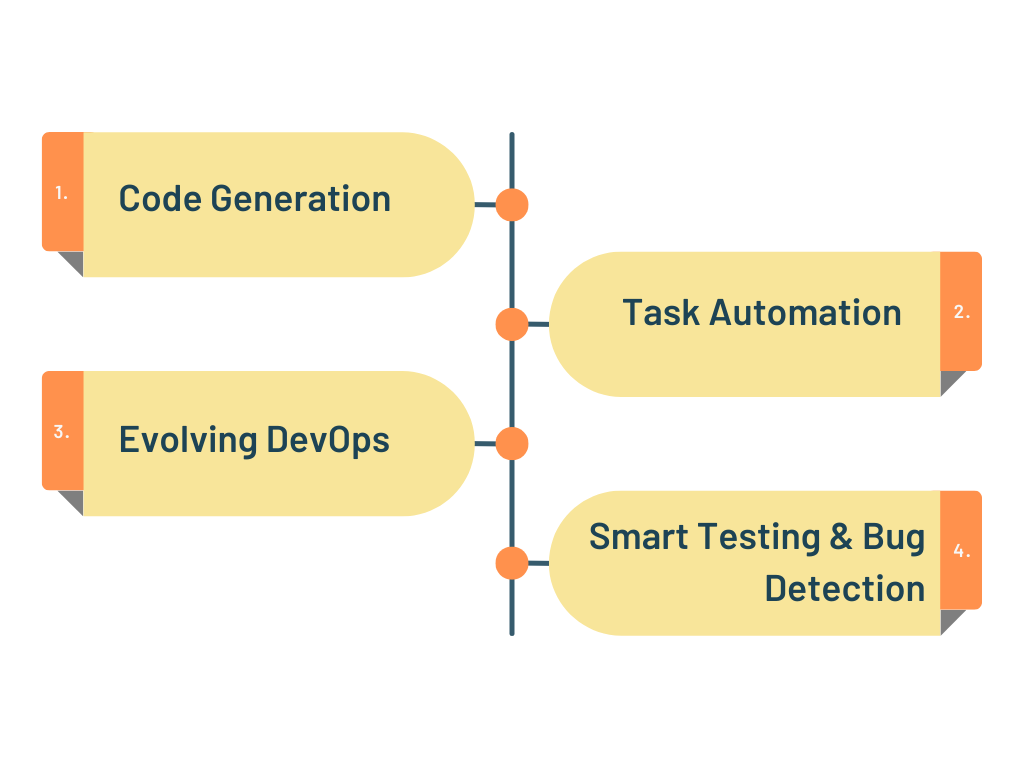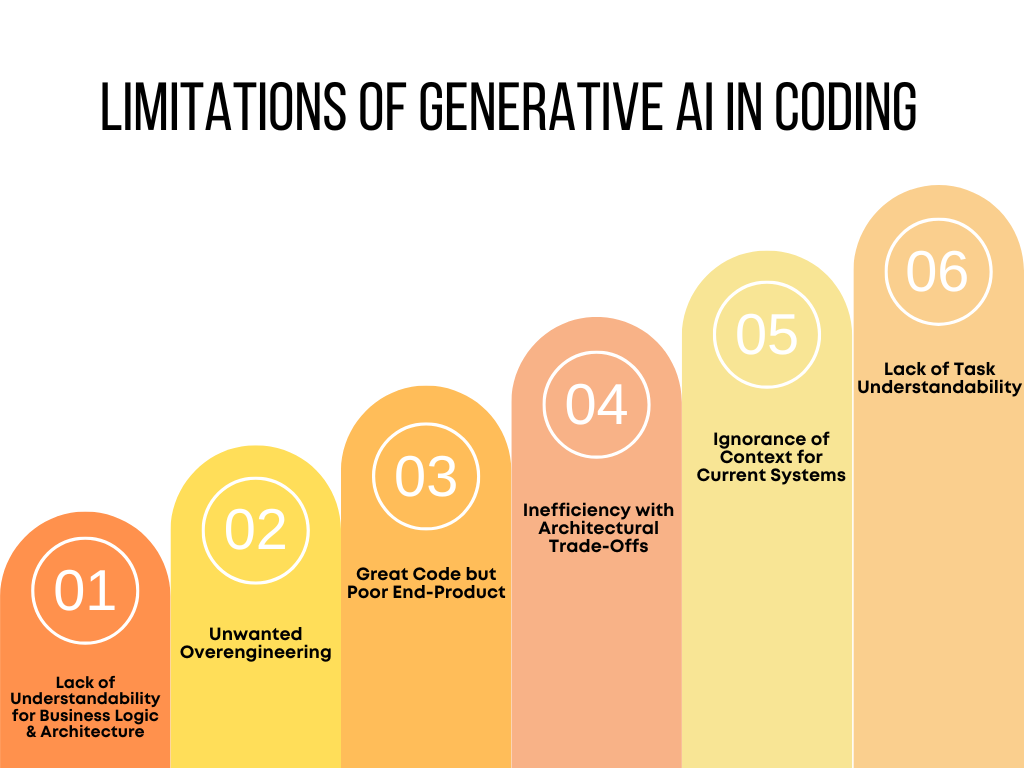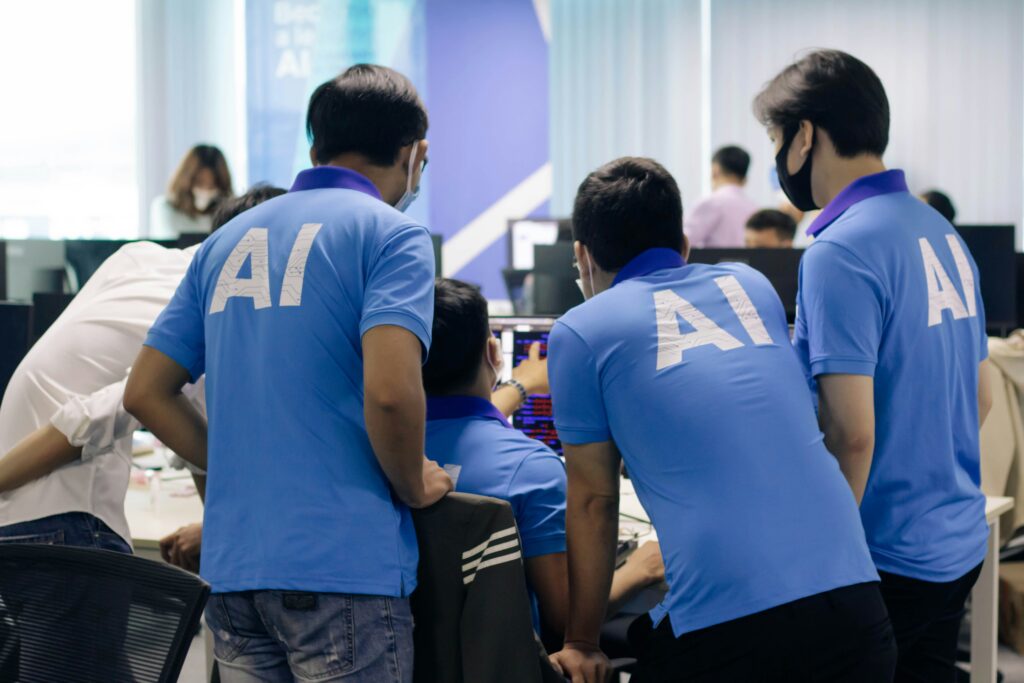With artificial intelligence at its full might, it might have got you wondering, will it replace software developers at one point or another? Well, you might not be the only one to think it that way.
Today, there are numerous tools out there that assist a team in generating code snippets, both simple and complex, saving ample time and resources. Seeing such fast-paced growth of AI in the field of coding, there is a possibility that the need for human coders will be a thing of the past in the near future.
However, the reality is actually different from what the usual expectations of software developers are! In this article, you will learn about what the actual role of AI is in software development, and find the answer to whether it will replace developers.
Read along till the end to get a thorough industry-wide reality check!
What’s the Role of AI in Software Development or Engineering?

Before knowing whether or not AI will replace developers, you must be aware of this technology’s actual impact or role in software engineering.
In the past few years, AI has transformed the way companies perceive software development. There have been new advancements and efficiencies to streamline the entire process. Today, developers leverage the potential of AI for several tasks, including:
1. Code Generation:
AI tools can now be used for generating code based on existing examples or patterns. It means developers can now get auto-complete suggestions in the IDEs (Integrated Development Environments), and also generate code snippets for some specific functions.
Some of these tools can also help in optimizing existing code by assessing and identifying inefficiencies in it. Furthermore, such tools also suggest improvements. However, the AI-generated codes aren’t flawless every time, and would demand human review to ensure efficiency and quality.
2. Task Automation:
In order to make software development more efficient, experts tend to automate their repetitive tasks through dedicated AI tools. From generating and refactoring code to detecting bugs and suggesting resolutions, everything can be automated using AI.
When developers can handle such routine and tedious tasks, it leaves them with more time to focus on other critical or complex aspects of the software development process.
3. Evolving DevOps:
With the potential of AI, the CI/CD and DevOps pipelines are gradually reshaping. It has been made possible with an analysis of code changes, production metrics, and test results. Attaining such insights through AI will help you improve the code performance, detect potential issues, and streamline the overall development process.
In short, AI-driven DevOps has the capacity to enhance the efficiency of software deployment and boost its overall quality.
4. Smart Testing & Bug Detection:
Testing is one of the integral steps in a software development lifecycle, and AI has enhanced that attribute immensely. There are AI-driven tools capable of analyzing code to detect vulnerabilities and generate automated test cases that align.
With the ML (machine learning) models continually learning from the prior test results, it becomes easier for AI to predict which areas of a particular code can be prone to errors or bugs. Such a proactive approach has helped developers identify, assess, and fix code issues at the earliest. Thus, a software is built to be robust and error-free!
What are the Limits of Generative AI Being Used in Coding & Software Development?

The key application of artificial intelligence, generative AI, is the epitome of this technology, which is being utilized in the software industry. So far, generative AI has proven its efficiency in producing quick working codes. However, the true capabilities of this technology are limited when used for real-world and complex software development projects.
To help you better understand why AI is still far from replacing developers, here are some limitations of this technology for you to consider:
1. Lack of Understandability for Business Architecture and Logic:
Even the most empowered and precisely trained AI model is incapable of seeing the complete picture of a software development project and the goals that drive it. In addition to that, an AI model might not be able to point out all the constraints in your project that matter. Due to this, the end solution may be misaligned from what your business actually needs.
2. Overengineering:
When using AI for generating complex codes, there is a possibility that you will end up having unwanted modules, layers, or services, which is a common limitation of the technology. For instance, when building a simple software application using AI, there’s a chance you will end up having excessive backend, leading to the need for extensive deployment or maintenance efforts.
3. Great Code but Poor Product:
It is true that AI can write some code fragments, but it can’t deliver you an entire solution, especially when high-end UX, scalability, security, and long-term support aspects are involved. Such a limitation indicates how important it is to have a human mind work on the core attributes of a software development project.
4. Inefficient with Architectural Trade-Offs:
Unlike AI models, a skilled developer often evaluates the right balance between all stages of software development, including speed, maintenance, cost, and other such factors. It is an important attribute that leads to the efficiency of an entire project. On the other hand, AI cannot weigh such factors and might suggest an unnecessarily complex method.
5. Ignorance of Context for Current Systems:
AI tools being used for coding will not take into consideration how the new codes will integrate with your current infrastructure. Due to this, the software project will lead to additional costs or incompatibilities for rework.
6. Lack of Task Understandability:
In order to get the best out of AI tools for software development, it is important for the prompts to be clearly written or modified. At times, the code prompts might stretch to a full page. Due to this, the entire process will slow down, forcing you to spend extensive time refining the prompts, and you might not be able to move directly to implementation.
In What Ways are Human Developers Still Better than AI in Software Engineering?
To give you a clear perspective on the importance of a developer over AI in software engineering, here are some ways the former is better than the latter:
1. Understanding Business Contexts
Developers will be able to analyze goals associated with a software development project and assess them with respect to the target audience. Human professionals will also be able to assess the long-term objectives of a software development project, leading to better process execution with the assistance of AI.
2. Make Architectural Decisions and Optimizations
Your team of developers will have an upper hand in balancing speed, simplicity, maintainability, and cost of the software project. At the same time, they will also be able to avoid any unnecessary modules and simplify the overall process whenever possible.
3. Seamless Integration with Existing Systems
Beyond developing a separate software solution, there will be a need to integrate it with existing business systems. In that case, a developer will be responsible for planning the seamless integration of a new software product with the existing systems of a client or organization.
4. Ethical Considerations
Human developers bring in ethical considerations with their coding practices. It is a very crucial aspect in developing software solutions that can impact society. For instance, humans will prioritize privacy concerns, security, and other such attributes, ensuring a better software product.
5. Creative Coding
AI might be efficient in generating certain snippets of code, but it might miss out on the creative side of the task. Developers writing manual code often leverage creativity, blended with innovative thinking, for curating a software product. It is an important trait to overcome complex coding complexities.
Is AI a Threat to Software Developers?
It is absolutely true that AI has been part of noteworthy advancements in the past few years, and a lot of software engineering tasks have received aid from it. However, there are still a lot of coding and software development tasks that are entirely dependent on human expertise and can’t be replaced by AI.
For instance, AI might thrive in streamlining repetitive or redundant tasks, but developing high-performance software demands more creativity and intense problem-solving capabilities.
So, will AI replace developers? Probably not! However, there is always a constant need for experts to stay updated with the latest skill demands for the domain. To give you more clarity, here’s why AI isn’t a threat to software developers:
- AI tends to reduce some form of responsibilities associated with coding, testing, and other such basic attributes of software development, whereas it cannot fully replace the human tasks entirely.
- There will always be a need for an architect to craft AI modules or tools that can support the overall process of software development. Thus, it indicates that even AI relies on human intelligence, which is why it cannot be a threat to developers.
- There are human minds, expertise, and talent behind every AI tool that persists or is being utilized for software development. As the demand grows, there will be a need for proficient human developers to build more advanced AI platforms.
- The dependence on software is growing aggressively across all industries, and there will be a need for a high rate of production, which can’t be achieved with AI tools alone. Efficient human developers must collaborate with AI tools to make that happen!
- AI tools can assess cybersecurity flaws based on past data, but they can’t replace human experts, as they bring in a different set of skills to the table. The latter can assess multi-faceted threats and understand the context around them, which isn’t possible for AI tools that rely just on data patterns.
Conclusion
AI replacing developers isn’t going to happen anytime in the near future! Yes, the level of sophistication that AI has evolved to adopt is exceptional, but that doesn’t degrade the efficiency or need for a human developer to tailor a software solution.
Generative AI will give you the code components and even perform automatic refactoring. However, building a software solution isn’t just about writing the code, but is about connecting with the goals, audience needs, design architecture, and more.
A plan to build high-performance software demands thorough risk assessment, system integrations, and long-term support, which isn’t possible for AI to achieve without human assistance. Therefore, human developers are and will be paramount for software development, even with the best of AI features existing in the industry.



